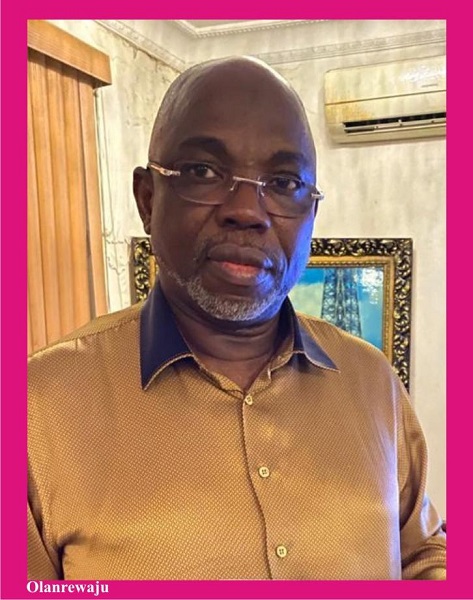 By Kenneth Jukpor & Yusuf Odejobi
By Kenneth Jukpor & Yusuf Odejobi
Alhaji Hakeem Olanrewaju is a former Governing Board Chairman of the Council for the Regulation of Freight Forwarding in Nigeria (CRFFN). He is also a Co-Founder of the Congregation of Registered Freight Forwarding Practitioners of Nigeria (CREFFPON). In this exclusive interview with MMS Plus he speaks on the many ills in the nation’s freight forwarding sector, highlights the unattended role of CRFFN and reveals the goals of CREFFPON. Olanrewaju also proffers solutions to some thorny maritime sector issues. Enjoy it.
Let’s talk about CREFFPON; what inspired it?
CREFFPON isn’t an association but a voluntary movement of registered freight forwarders. We have been quiet for so long but the happenings in the sector have been unexpected and worrisome. This group is for duly registered freight forwarders who must be up-to-date with their dues to the Council for the Regulation of Freight Forwarding in Nigeria (CRFFN). Since this business of freight forwarding is the only profession most of us have practiced for decades, we have to put things in order. This group is a voice which the industry has to listen to. At the International Federation of Freight Forwarders (FIATA) there is also a movement like CREFFPON and the goal is to assist the regulators and provide direction when we perceive that they aren’t going the right way.

One of the biggest challenges for freight forwarders in Nigeria is inadequate training and there is the Practitioners Operating Fees (POF) which should help CRFFN play this role. Why hasn’t this POF regime taken off?
There have been several concerns about POF but I’m not against it. However, there must be genuineness in handling that fund. CRFFN would actually be using this fund to create an avenue for freight forwarders training but the practitioners will have to pay for the training. The problem with POF is that the practitioners don’t have confidence in the agency.
CRFFN should be responsible for training the trainers that will educate the freight forwarders. There’s also a dire need for libraries that are of international standards because there isn’t any library with relevant books on freight forwarding in Nigeria. There should also be a holistic approach that would avail enlightenment on this profession from primary and secondary schools.

There should be elementary books, radio jingles and other sensitization programmes about this profession. These are the areas CRFFN’s money should be channeled to and not building edifices as headquarters or regional offices. It is the rich investment in training and sensitization from the primary and secondary schools that would encourage young ones to pick interest in freight forwarding, logistics and other aspects of supply chain when they get to tertiary institutions. Other aspects of freight forwarding include; sea freighting, land border businesses, handling dangerous goods, among others.

Looking at the last two annual budgets of CRFFN, there are repetitions of several projects. Given this development, should freight forwarders have confidence in allowing CRFFN to collect and manage POF?
The budget is simply round tripping. In the 2020 budget, the agency said the edifice it was building was 90 percent complete. Why is it being repeated in the 2021 budget? It is obvious that we need attitudinal change and this is important for posterity. If my child walks up to me and says daddy I want to do this profession you’re doing, which course would I ask him to study? Which institution would I refer him to? These are issues CRFFN should address because freight forwarding is still a new concept in Nigeria, whereas, it is a big industry in Europe, Asia and America.
As a former Governing Board Chairman of CRFFN, after raising your concerns on the agency’s 2021 budget, it was expected that the leadership of CRFFN put forward some explanation to clarify the issues but that didn’t happen. Did you get a reaction on a personal note?
CRFFN has been taken over by politicians. The six appointees from the geopolitical zones ought to be freight forwarders but only the board chairman is a practitioner. All the board members ought to be pre-qualified but they are just appointees even from the associations. As the pioneer team, we came in as a start-up but we went for executive training and we have certificates. At that time, we picked two lectures from six universities across the geopolitical zones and trained them. From the associations, we trained two persons each and we extended this training to representatives from shipping companies and terminals operators.
Before our board vacated, we pushed for a system of election for board members at CRFFN and that is what the Act says. The Act also emphasizes that the aspirants must be practitioners but what we have is a system of selection. I urge the Minister of Transportation to address this even though his role is just to advise. I haven’t met with the CRFFN Registrar since he was appointed.
Should freight forwarding, especially the aspect of customs brokerage be reserved for Nigerian citizens in the country?
In most countries, if you aren’t an indigene you can’t practice Customs brokerage and you can’t access their ports. This is the practice in America, Benin Republic, Ghana, among others. Besides creating employment for indigenes, there’s also the issue of security which should be prioritized. In Nigeria, it is unfortunate that everyone has access to the ports.
Customs brokers have the onus of protecting their nations. A broker will be indicted if a foreigner should import arms using his company. Someone can’t bring a bill of lading to my office and I do the job without profiling the person. I ask for the person’s full name and original international passport. A look at the international passport shows the countries the person has visited and gives you an insight into what’s in the container.
If the importer has been to several high risk nations you should give him paper to write out what is in the parking list. At the point of examination, based on your findings or suspicions you can inform the security agents to be at the client’s office or home while the examination is taking place. As an agent, this approach will enable you to manage the risks.
Another issue is that there is no data of freight forwarders in the country which should be addressed by CRFFN. When multinationals have project cargoes in Nigeria, they can’t access a directory to see the companies and examine the projects such freight forwarding companies have handled in the past.
There was a conference in Vietnam where I gave a paper presentation and I was asked why some Nigerian freight agents abandon their jobs halfway. I told them that the agent probably didn’t do accurate quoting. Most times some agents are too excited about huge jobs and don’t factor in some issues thinking that clearing 100 cargoes is like clearing two or four cargoes. Since most freight forwarders can’t provide accurate quotations for huge jobs, they get stuck when the sum they charged isn’t sufficient. At that point they will ask for more money and the importer wouldn’t entertain such behaviour.
Recently, industry stakeholders observed that FIATA delisted CRFFN as it failed to pay its annual dues and CRFFN blamed this development on the COVID-19 pandemic. As a registered member of FIATA, how do you pay your dues and is CRFFN’s story valid?
CRFFN collects N30 million every year for FIATA engagements. What does the agency do with that fund if it gets delisted? Why don’t they pay their FIATA obligations when they budget N30 million for FIATA annually? As a member of FIATA, I pay my individual membership fees and this payment has always been online. They didn’t suspend payments on account of the COVID-19 pandemic so that argument by CRFFN isn’t tenable.
FIATA operates wholly online except during special occasions for conferences. CRFFN budget is higher than that of FIATA. FIATA is using a floor in an edifice in Zurich. They don’t own the whole building and CRFFN can copy this model. CRFFN doesn’t need mighty edifices to be effective. CRFFN is like the National University Commission (NUC) which approves the establishment of training institutions and their courses. NUC only needs a library for people to have knowledge of the requirements for universities and this library can be online. This should be CRFFN’s role as facilitator and the body should organize frequent conferences that align with FIATA and similar bodies in Africa and other continents to exchange programmes and strategies.
How do we create the balance in Customs priorities between generating revenue which is essential to the government and ensuring legitimate trade is facilitated?
There are lots of intrigues as well as misconceptions on this. Customs generate revenue to do the needful for the government but those approaching their portal have to do the right thing as well. People should do the integrity test, do proper declaration and pay correct duties to prevent any issue.
Nevertheless, there are lots of bottlenecks; we just use Customs because they are the leading port agency. When Customs release your cargoes within 24 hours but some cargoes remain at the port for the 7 days, is Customs delaying you? No. There are several issues but we always blame it on Customs.
Following your recent award from the World Customs Organization (WCO), what’s your advice to freight forwarders in the sector about integrity and commitment to established trade rules?
I thank God and also the WCO for finding it meritoriously to give me the award. I also thank the Nigerian Customs that made the move. When NCS put my name forward for the award, I know that people must have carried out checks to look at the profile of the person and the company that had been submitted.
It takes a lot of sacrifice to get integrity. I wasn’t even expecting anything from that area but in my life I have always believed in doing the right thing. Doing the wrong thing will always lead to problems, so, my advice to freight forwarders is to do the right thing and prioritize integrity.
 MMS PLUS NG – Maritime, Aviation, Business, Oil and Gas News Online Newspaper with coverage in Maritime, Oil and Gas, Aviation, Power and Energy as well as Financial News
MMS PLUS NG – Maritime, Aviation, Business, Oil and Gas News Online Newspaper with coverage in Maritime, Oil and Gas, Aviation, Power and Energy as well as Financial News









